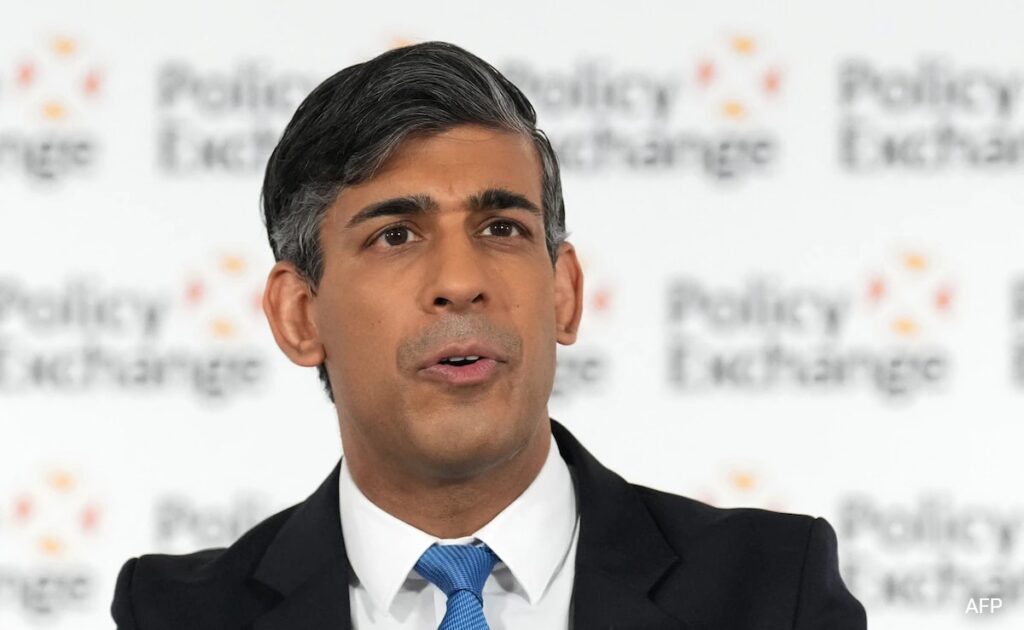
British Prime Minister Rishi Sunak's decision to stake his Conservative Party's future on a rare summer general election was made in secret, with even Chancellor of the Exchequer Jeremy Hunt appearing surprised by the plan.
A person familiar with the Treasury said Mr Hunt's aides did not know enough about the general election Mr Sunak had called on Wednesday, and the rumored big announcement was due to the fact that the chancellor would be replaced in a reshuffle. Some were concerned that this might mean something. While the Prime Minister prepared to hold a press conference outside No. 10 Downing Street to announce his decision, Mr Hunt canceled media appearances to discuss the morning's inflation data and attended a major conference in Italy on Thursday. He was busy, cutting short a trip to a meeting of finance ministers from seven countries.
Some ministers supported the decision to hold an election, and regions secretary Michael Gove praised the move, according to a person familiar with the discussions.But there was widespread disappointment among Conservative lawmakers, including some ministers, at the risk of losing dozens of seats in an election that would leave Hunt the most vulnerable of his cabinet.
Many long ago accepted Mr Sunak's call to “stick to the plan”, interpreting it as waiting for the expected improvement in economic conditions later this year – dependent on a series of economic events indicating Britain had turned a corner.
As recently as last week, Mr Hunt had hinted that he might cut payroll taxes again in his autumn budget report, leaving it up to the next government to decide. Foreign Secretary David Cameron, a former prime minister and current member of the House of Lords, on May 12 backed plans to wait until the end of the year to hold an election.
Low support for the summer vote has raised questions about how keen the party is to see Labor leader Keir Starmer become prime minister. One sitting government minister, speaking on condition of anonymity, said a July 4 vote date was a terrible idea, given the Conservatives' 20-point lead over the main opposition Labor party. Ta. Another cabinet minister said the timing showed Mr Sunak had given up and was no longer interested in being prime minister.
For months, Mr Sunak's aides have avoided saying exactly when an election will be held. As a result, Tory MPs complained that Mr Sunak was using intimidation to try to stop them from joining the campaign to replace the leader. Tory rebels had argued that the party was at risk of being forgotten, squeezed by the left-wing Labor and Liberal Democrats and the Reform Britain party, founded by right-wing Brexit campaigner Nigel Farage. .
Some Tory loyalists took to social media to criticize the timing of the election, with Tracy Crouch and Dehenna Davison telling X that they are not achieving what they hoped to achieve in Parliament. I wrote that I was disappointed. Indeed, a surprise election will likely mean that some key legislation, including a progressive smoking ban, which he promised at last year's Conservative Party conference and King's Speech, will be scrapped.
Instead, Mr Sunak appears to have calculated that it would be more advantageous to time the vote to coincide with the launch of flights to return asylum seekers to Rwanda, and he wants to make the issue the centre of the campaign. Mr Sunak said he hoped the first flights would depart by early July, giving him a talking point to counter the main driver of the vote for reform.
Anger within the Conservative party was directed not just at the timing of the election, but also at the manner in which Sunak delivered his speech, which took place in a rain-soaked room outside Downing Street and was almost drowned out by protesters' music. Several Conservative politicians, including cabinet ministers, privately told Bloomberg that he should have kept an umbrella with him or made the statement indoors.
Home Secretary James Cleverley spoke late on Wednesday to a room of about 100 Tory MPs and campaigners in east London, insisting Mr Sunak was the right person to lead them to an election. “We need leaders at the top of government who are willing to make the right choices,” Mr Cleverley said, echoing Mr Sunak's assertion that the country would be less secure under a Labor government.
Mr Cleverley noted that during Mr Sunak's time as finance minister, subsidies to cushion the economic blow from the coronavirus had boosted his approval ratings. “Inflation is now back to where it should be,” he said, adding that was “due to the choices Rishi Sunak made when he was Chancellor of the Exchequer and the choices he made when he was Chancellor.”
One MP, speaking on condition of anonymity, said it was a good move and he was happy about it. Another said it was either a stroke of political genius or incredibly selfish. They didn't know which.
(Except for the headline, this story has not been edited by NDTV staff and is published from a syndicated feed.)


